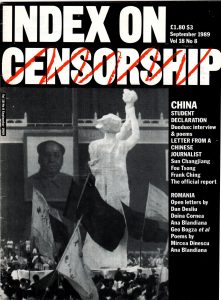2 Aug 2018 | Statements
Index on Censorship condemns the apparent decision by Google to do business in China.
According to a report published by the Intercept, leaked documents disclose the Google is planning a censored search engine in the country.
“We’re appalled that Google — which has repeatedly stressed its commitment to freedom of expression – should effectively collude with one of the world’s most oppressive regimes in this way. We will be urging Google to drop Dragonfly and resist attempts by governments worldwide to restrict freedom of speech rather than providing those governments with tools to further undermine democracy,” Jodie Ginsberg, Chief Executive, Index on Censorship said.
1 Aug 2018 | China, Magazine, News and features, Student Reading Lists

China: student declaration, the September 1989 issue of Index on Censorship magazine.
Subscribe to Index on Censorship magazine here
Index has covered censorship in China since 1973. While the government’s approach has evolved in today’s digital era, in the aftermath of the Tiananmen Square massacre of 1989, key themes surrounding the suppression of political dissent and free expression remain as pressing as ever. Explore them in this reading list featuring prominent Chinese academics, activists and writers.
Tiananmen Remembered
May 2009 vol. 38 no. 2
Wang Dan, a leading figure in the 1989 protests, talks to the writer Xinran about the fallout and the legacy of Tiananmen. Wang Dan was released from prison in 1998 and exiled to the United States. He completed his PhD at Harvard University. He is chairman of the Chinese Constitutional Reform Association and on the advisory board of Wikileaks. Xinran worked as a journalist and radio presenter in China. She now lives in London. Her books include The Good Women of China (Vintage), Sky Burial (Vintage) and China Witness (Chatto & Windus).
Read the full article here.
Tiananmen Square
June 1989 vol. 18 no. 8
Student leaders Liu Xiaobo, Zhou Duo, Hou Dejian and Gao Xin declared a hunger strike in Tiananmen Square just before the massacre on the night of 3-4 June 1989. This translation of excerpts of the declaration was first published in The Independent, 10 June 1989.
Read the full article here.
From Coming back to life: written for the ‘Tiananmen mother’
December 2010 vol. 39 no. 4
This poem was written by Chinese poet Shi Tao who has faced censorship, government threats and imprisonment for his work. It was translated by English scholar Frances Wood.
Read the full article here.
A date (not) to forget: The author on why her book about Tiananmen would be well-nigh impossible to research today
April 2018 vol. 47 no. 1
China has passed a law to make telling the wrong sort of history punishable. Louisa Lim, author of a book on the Tiananmen Square massacre, says she wouldn’t be able to research her book today.
Read the full article here.
Chinese whispers
September 1999 vol. 28 no. 5
In 1999, the 10th anniversary of the Tiananmen massacre passed quietly enough but as British journalist John Gittings writes, the desire for change and for democracy in China is as strong as ever.
Read the full article here.
DuoDuo’s view from death
September 1989 vol. 18 no. 8
One of China’s leading young poets Li Shizheng, known as DuoDuo, was in Tiananmen Square on the day of the massacre. He flew to Britain the day afterwards, where he was interviewed by Gregory Lee for Index.
Read the full article here.
Subscribe to the print edition Index on Censorship magazine here for £35 or take out a digital subscription via Exact Editions (just £18 for the year, with a free trial).
1 Aug 2018 | Index in the Press
Index CEO Jodie Ginsberg tells The Telegraph: “We’re appalled that Google — which has repeatedly stressed its commitment to freedom of expression – should effectively collude with one of the world’s most oppressive regimes in this way. We will be urging Google to drop Dragonfly and resist attempts by governments worldwide to restrict freedom of speech rather than providing those governments with tools to further undermine democracy.” Read the full article.
8 Jun 2018 | Index in the Press
Louisa Lim: To write my book The People’s Republic of Amnesia: Tiananmen Revisited, I spent a lot of time in fast-food restaurants. Not because I like burgers, but because dissidents often favour the crush of diners and the buzz of conversation, believing it complicates surveillance. As I sat in McDonald’s with Bao Tong – who spent seven years in jail as the highest government official to be sentenced post-Tiananmen – he could point out which plainclothes policemen were shadowing him. Read in full.

